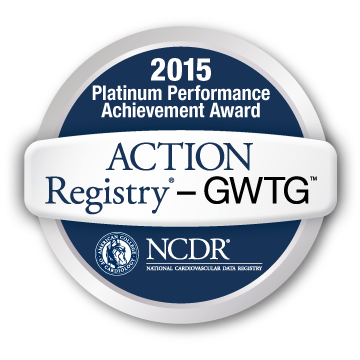




Methodist Hospital Receives American College of Cardiology Award for Cardiac Care
Published: July 16, 2015NCDR ACTION Registry–GWTG Platinum award recognizes high standards
OMAHA – Methodist Hospital has received the American College of Cardiology’s NCDR ACTION Registry–GWTG Platinum Performance Achievement Award for 2015. Methodist is one of only 319 hospitals nationwide to receive the honor.
 The award recognizes Methodist’s commitment and success in implementing a higher standard of care for heart attack patients and signifies that Methodist has reached an aggressive goal of treating these patients to standard levels of care as outlined by the American College of Cardiology/American Heart Association clinical guidelines and recommendations.
The award recognizes Methodist’s commitment and success in implementing a higher standard of care for heart attack patients and signifies that Methodist has reached an aggressive goal of treating these patients to standard levels of care as outlined by the American College of Cardiology/American Heart Association clinical guidelines and recommendations.
“This award is a proud achievement for Methodist Hospital,” said Charles Olson, MD, medical director of cardiology at Methodist Hospital. “It reflects the hard work and dedication of the staff who care for some of our most seriously ill patients and their families. The implementation of these guidelines requires successful coordination of the cardiovascular team and emergency personnel and is a critical step in saving the lives and improving outcomes of heart attack patients.”
To receive the ACTION Registry–GWTG Platinum Performance Achievement Award, recipients consistently followed the treatment guidelines in the ACTION Registry–GWTG Premier for eight consecutive quarters and met a performance standard of 90 percent for specific performance measures.
Full participation in the registry engages hospitals in a robust quality improvement process using data to drive improvements in adherence to guideline recommendations and overall quality of care provided to heart attack patients.
“The American College of Cardiology and the American Heart Association commend Methodist for its success in implementing standards of care and protocols. The full implementation of acute and secondary prevention guideline-recommended therapy is a critical step in saving the lives and improving outcomes of heart attack patients,” said James Jollis, MD, FACC, ACTION Registry-GWTG Chair and Professor of Medicine and Radiology at Duke University Hospital.
The Center for Disease Control estimates that over 700,000 Americans suffer a heart attack each year. A heart attack occurs when a blood clot in a coronary artery partially or completely blocks blood flow to the heart muscle. Treatment guidelines include administering aspirin upon arrival and discharge, timely restoration of blood flow to the blocked artery, smoking cessation counseling and cardiac rehabilitation, among others.

